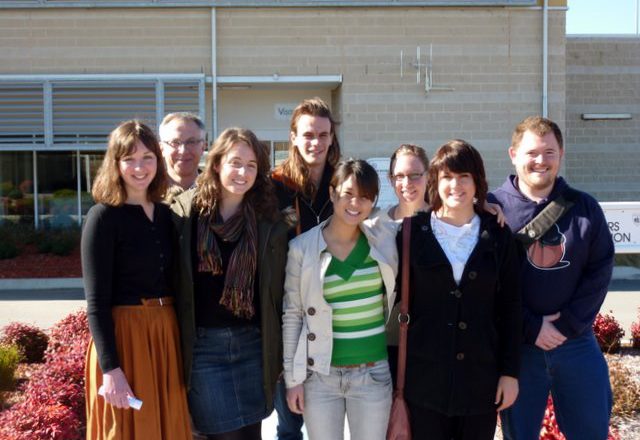
Right Now’s Adelaide Rief spoke with Georgia Davis, Amy Sinclair and Stefanie Schweiger, students at ANU College of Law who have been a part of the Prison Issues Project, an initiative of the College’s Law Reform and Social Justice program.
Right Now: It would be great if you could start by explaining a little bit about the ANU Prison Issues Project and the legal literacy project.
Georgia Davis: The legal literacy project is an intensive program where law students educate detainees of the new ACT human rights-compliant prison, the Alexander Maconochie Centre (AMC). Each week we discuss and debate issues pertaining to the detainees. These issues include prison legislation, human rights and legal procedure.
How did you get involved with the Prison Issues Project? Have you always been interested in working in the area of prisoners’ rights and social justice?
Amy Sinclair: By the start of my third year of law, I was starting to feel like I had enough of a grounding in the law to be able provide meaningful help to those in need. I was particularly drawn to the Detainee Support Program initially out of a natural curiosity – I drive past the prison all the time and often catch myself wondering what goes on behind the fences and brick walls. But it is what kept me coming back that surprised me the most – the genuine connection that we made as a group with the prisoners, and a real desire to explore their increasingly candid insight into the tail end of the criminal justice system.
Stefanie Schweiger: Prisoners’ rights is a very niche area so I wouldn’t say that I’ve always been interested. But, having become so appreciative of the men I’ve worked with in the AMC and their interest in the program has definitely encouraged and maintained my interest and future involvement in the prison. I feel, as I’m sure all the participants do too, incredibly lucky to be part of a project like this.
Has the Prison Issues Project changed in scope and focus since you started there two years ago?
GD: The legal literacy project has developed in a very organic way. Originally just three students visited a ‘Sentenced Unit’ and the topics they discussed ranged from the rules which directly govern incarceration through to Gough Whitlam’s dismissal! The content of each session is usually based on ideas expressed or questions detainees have asked in previous sessions. The organic nature of the program is important. It allows us to create a true feeling of mutuality, so we can demonstrate we are genuinely interested in the detainee’s ideas and are not simply preaching. However, part way through last year we decided it was time to develop a clearer vision for the project, so a small team of students and lecturers underwent an extensive strategic planning process where we worked to develop the following vision statement:
Breaking down barriers, empowering participants and fostering meaningful dialogue. Cultivating empathy, self respect and self awareness. Equipping participants with the skills and self confidence to become leaders and teachers themselves. Achieving these goals through discussion of the law and legal issues.
We also discussed potential longer term, bigger picture implications or extensions for this project. We identified a key constraint to prison system reform is the public’s perception of convicted criminals. As such, we hope to host academics and other professionals from the corrections field for public talks regarding prison issues. We wish to report on our experiences and insights from the legal literacy program to demonstrate the problems with incarceration in the ACT, the needs of detainees who demonstrate genuine interest in their own rehabilitation, and to counter the general perception that criminals are simply bad people and that it’s a good thing they are locked up.
Did you face any obstacles running the program in such a heavily controlled environment?
GD: The most significant obstacle we faced actually regarded the prison administration. Sometimes we would arrive at the AMC at nine am but would only be taken down to the programs area one or two hours later because there were no available staff. The programs area was a comfortable learning environment with good natural light, enough room for a group of twenty, and a white board. To the credit of the students and lecturers facilitating the program, the same group of prisoners came to nearly every session (even though occasionally we were two hours late), which allowed us to develop a holistic six-week program and to build on learning from previous sessions.
The only image I had in my head of a prisoner was from TV dramas.
What were the reactions of staff and officers to the program – were they positive or wary of the aims and outcomes of the project?
GD: Some of the prison officers were very enthusiastic about our program, and others regarded it with a degree of caution. Their primary concern seemed to be that our program would teach prisoners about their rights and that they would begin to assert/demand these rights in a manner which would make them difficult to manage. There were also concerns we were there to teach the prisoners how to exploit legal loopholes. Although we did teach prisoners about their rights and responsibilities, we also discussed the extensive discretion that prison officers can exercise to ensure that justice, security and good order in the AMC is maintained. We chatted with various prison officers to explain the objectives and limits of the program to try and allay their concerns, as without their support, we would not be able to run the program.
SS: What’s important for us is to keep our program going because nothing sways minds like a strong program that is doing good things for the community, students and men and women inside.
I understand you are campaigning for the legal literacy project to be extended to the female prison. Can you tell me a bit about this?
AS: The Women in the AMC Initiative is very much in its infancy. Our ultimate goal is to extend access to the program currently being run in the male side of the prison to the women currently incarcerated in the AMC. Unfortunately, it’s not simply a case of copying and pasting the structure and materials from past iterations of the program. Surface issues to address before we can design a useful program include: there are far fewer women detained in the ACT than men (often fewer than ten), and security classifications are mixed (i.e. women on remand v sentenced prisoners).
SS: Then consider that 98 per cent of women in prison have experienced physical violence or abuse, and 89 per cent have experienced sexual assault or sexual abuse. For over two thirds of women in prison, the sexual assault started when they were below ten years old. Most have grown up in families in which they are not valued. Over 60 per cent were wards of the state. Most have entered into abusive relationships which reinforce the world they experienced as children. Evidently, there are huge issues with something like this and a considerable amount of work needs to be invested into this but it definitely has to happen.
We identified a key constraint to prison system reform is the public’s perception of convicted criminals.
What was it like working directly with prisoners through the legal literacy program?
AS: To be completely honest, I was pretty nervous the first week and I could tell that my colleagues were too. We had been through a rigorous safety training program the previous week and had received some pretty harrowing advice about physical and psychological violence within the prison. The only image I had in my head of a prisoner was from TV dramas, so I expected to greet a room full of enormous guys in orange jumpsuits with tattooed eyeballs and bad attitudes. I was blown away to instead meet a group of ordinary guys who I wouldn’t think twice about sitting next to on the bus. What surprised me the most I think was the degree of intellectual engagement they brought to each discussion, and the extent to which they were willing to share their personal experiences of the court process and life within prison. They had a really perceptive insight into the underlying social and economic causes of crime, and were willing to explore new ideas and adopt the new ways of thinking about the interaction of human rights and the criminal justice system that we tried to introduce.
The big lesson here was that fundamentally we’re all just a few poor decisions away from their situation and it helps to remember that just because a person has been convicted of a crime, it doesn’t change the fact that they are still ordinary people with mortgages, families, ambitions and personal philosophies.
GD: For me it was incredibly rewarding and fun. The prisoners who took part in the program were almost always engaged and interested in the issues we discussed, and they offered opinions and perspectives that completely surprised us.
In one session, we were discussing the various purposes of sentencing, and we had the prisoners decide what sentence Justice Einfeld (the NSWSC judge who was caught speeding then committed perjury) deserved. One group thought he deserved a fine because everyone makes mistakes and lies to get out of trouble; another thought he should have been given community service because this would teach him he is not above the law. Another group thought he deserved significant jail time because he was a judge, he dispensed the law and the community trusted him. His betrayal of that trust deserved severe punishment. At that moment, the concept of discretion – which had been discussed extensively in a previous session – clicked with a number of detainees.
Has working on the Legal Literacy Program changed your perspective regarding the efficacy of the justice system for prisoners?
GD: There are no work programs within the AMC and a number of prisoners said they would like the opportunity to further develop skills as having a full time job to keep them occupied is crucial to prevent them reoffending. While it can be difficult for people with a criminal record to obtain employment, it becomes a lot harder when their skills are years out of date.
What is your view on the most urgently needed reforms to address prisoners’ rights in Australia?
GD: I think policy and prison management needs to be much better focused on prisoner needs. The transition from the prison environment to the real world must be as smooth as possible. This means having access to education or training in the prison, having better access to case workers, the capacity to immediately begin some form of employment and immediate access to Centrelink upon release. Without this, there is a high chance they will reoffend soon after leaving prison; some prisoners were quite up front about this.
Another obvious answer is a well managed needle exchange program. The levels of infection transmitted by shared needle use in prisons is insane.
Would you recommend the experience to other law students? How do you view the benefits of the program to both students and prisoners at the AMC?
GD: I think the program was tremendously useful for all of those involved. The program was a place where detainees could think about and share their thoughts on the legal system that has played such a massive role in their lives.
AS: I can’t recommend the program highly enough for students looking to put their fledgling legal skills to good use!
SS: Working with the men in the AMC has been an absolute privilege. It has been the most worthwhile experience of my law degree thus far.





